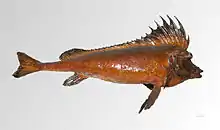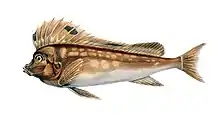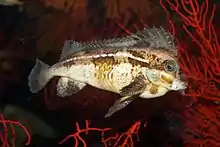Congiopodus
Congiopodus is a genus of marine ray-finned fishes belonging to the family Congiopodidae, the pigfishes or horsefishes. These fishes are found in the southern Atlantic and Pacific oceans.
| Congiopodus | |
|---|---|
 | |
| Smooth horsefish (C. torvus) | |
 | |
| Spinenose Horsefish (C. spinifer) | |
| Scientific classification | |
| Domain: | Eukaryota |
| Kingdom: | Animalia |
| Phylum: | Chordata |
| Class: | Actinopterygii |
| Order: | Scorpaeniformes |
| Family: | Congiopodidae |
| Genus: | Congiopodus Perry, 1811[1] |
| Type species | |
| Congiopodus percatus, a synonym of Blennius torvus Perry, 1811[1] | |
Taxonomy
Congiopodus was first formally described as a genus in 1811 by the English naturalist George Perry when he described Congiopodus percatus, the type species by monotypy. Subsequently, Perry's species was shown to be a junior synonym of Blennius torvus which had been described by the Dutch zoologist Laurens Theodorus Gronow in 1772, with an erroneous type locality of the Indian Ocean given for this southern African species.[1][2] The genus is the type genus of the family Congiopodidae, and some authorities regard this family as monogeneric,[1] but the 5th edition of Fishes of the World classifies three other genera within this family.[3] The family is placed in the suborder Scorpaenoidei which in turn is classified within the order Scorpaeniformes in that book but other authorities classify Scorpaenoidei within the Perciformes.[4] The name of the genus was not explained by Perry but may be a combination of the Greek gongulos, meaning "round", and podus, which means "foot", maybe referring to the roundish pelvic fins of C. percatus.[5]
Species
There are currently six recognised species in this genus:[6]
- Congiopodus coriaceus Paulin & Moreland, 1979 (Deepsea pigfish)
- Congiopodus kieneri (Sauvage, 1878)
- Congiopodus leucopaecilus (J. Richardson, 1846) (Southern pigfish)
- Congiopodus peruvianus (G. Cuvier, 1829) (Horsefish)
- Congiopodus spinifer (A. Smith, 1839) (Spinenose horsefish)
- Congiopodus torvus (Gronow, 1772) (Smooth horsefish)

Characteristics
Congiopodus pigfishes have a compressed body with a prominent snout, a terminal mouth and a single nostril on each side. It has small gill openings over the pectoral fins. They sometimes have no scales and, if they are present, they are tiny and spiny. The pelvic and pectoral fins have narrow bases and few unbranched fin rays. There are no sharp spines in the anal fin while the dorsal fin has between 14 and 21 spines and 11 and 14 soft rays.[7] These are medium sized fishes with the largest species being C. torvus which has a maximum published total length of 76 cm (30 in).[6]
Distribution and habitat
Congiopodus pigfishes are found in the southern Pacific and southern Atlantic Oceans.[6] They are demersal fishes with some species in shallow coastal waters and others living in deeper waters.[8]
References
- Eschmeyer, William N.; Fricke, Ron & van der Laan, Richard (eds.). "Genera in the family Congiopodidae". Catalog of Fishes. California Academy of Sciences. Retrieved 19 May 2022.
- Eschmeyer, William N.; Fricke, Ron & van der Laan, Richard (eds.). "Species in the genus Congiopodus". Catalog of Fishes. California Academy of Sciences. Retrieved 19 May 2022.
- J. S. Nelson; T. C. Grande; M. V. H. Wilson (2016). Fishes of the World (5th ed.). Wiley. p. 475. ISBN 978-1-118-34233-6.
- Ricardo Betancur-R; Edward O. Wiley; Gloria Arratia; et al. (2017). "Phylogenetic classification of bony fishes". BMC Evolutionary Biology. 17 (162): 162. doi:10.1186/s12862-017-0958-3. PMC 5501477. PMID 28683774.
- Christopher Scharpf & Kenneth J. Lazara, eds. (10 March 2022). "Order Perciformes (Part 10): Suborder Scorpaenoidei: Families Apistidae, Tetrarogidae, Synanceiidae, Aploacrinidae, Perryenidae, Eschmeyeridae, Pataecidae, Gnathanacanthidae, Congiopodidae and Zanclorhynchidae". The ETYFish Project Fish Name Etymology Database. Christopher Scharpf and Kenneth J. Lazara. Retrieved 19 May 2022.
- Froese, Rainer and Pauly, Daniel, eds. (2022). Species of Congiopodus in FishBase. February 2022 version.
- C.D. Paulin and J.M. Moreland (1979). "Congiopodus coriaceus, a new species of pig fish, and a redescription of C. leucopaecilus (Richardson), from New Zealand (Pisces: Congiopodidae)". New Zealand Journal of Zoology. 6 (4): 601–608. doi:10.1080/03014223.1979.10428402.
- McMillan, P.J.; Francis, M.P.; James, G.D.; et al. (2011). New Zealand fishes. Volume 1: A field guide to common species caught by bottom and midwater fishing. New Zealand Aquatic Environment and Biodiversity Report. Ministry of Fisheries. pp. 198–200. ISSN 1176-9440.